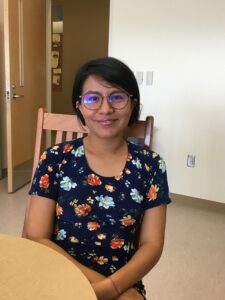Meet Our Wadsworth International Fellows: Bania Sinai Garcia Sanchez
 Bania Sinai Garcia Sanchez received her undergraduate degree at the Benemérita Universidad Autónoma de Puebla, Mexico and an MA in Amerindian Studies and Bilingual Education at the Universidad Autónoma de Querétaro, Mexico. Thanks to the Wadsworth International Fellowship she will continue her training with a PhD in anthropology at the University of Virginia, Charlottesville, VA, supervised by Dr. Mark Sicoli.
Bania Sinai Garcia Sanchez received her undergraduate degree at the Benemérita Universidad Autónoma de Puebla, Mexico and an MA in Amerindian Studies and Bilingual Education at the Universidad Autónoma de Querétaro, Mexico. Thanks to the Wadsworth International Fellowship she will continue her training with a PhD in anthropology at the University of Virginia, Charlottesville, VA, supervised by Dr. Mark Sicoli.
My name is Bania Sinaí García Sánchez and I come from a Zapotec indigenous community located in the Isthmus of Tehuantepec, Oaxaca. I completed my undergraduate degree in Linguistics and Hispanic Literature at the Benemérita Universidad Autónoma de Puebla. During my undergraduate years I wrote a research thesis entitled, “Towards an interpretation of the figure of the Zapotec mother in a portrait of my mother by Andrés Henestrosa”. I received my master’s degree in Amerindian Studies and Bilingual Education from the Autonomous University of Querétaro and wrote my Master’s thesis entitled, “Wedding Advice among the Zapotec Women of the Isthmus of Tehuantepec: A Discourse Genre.”
I have made it a priority to learn to speak my heritage language, to keep it, protect it, and preserve it. I have studied Zapotec as a second language for two years at the Language School of the Autonomous University of Oaxaca. I have also conducted fieldwork in my community and have collected legends and myths from oral traditions, interviewed women on ritual practice, made video recordings and taken photographs of the traditions of the people in the community, our festivals, and our rites. I have also investigated the discourse, pragmatics, semantics, and the use of verbs in advice given by women, and other speech genres. I hosted a literary workshop of Zapotec indigenous literature in the Faculty of Languages in the Isthmus of Tehuantepec of the Autonomous University of Oaxaca, where I taught two semesters of Zapotec oral traditions.
I applied to the Ph.D. program in Linguistic Anthropology at the University of Virginia because I believe studying there will provide me with the necessary skills to analyze, document, and share my indigenous language of the Isthmus of Tehuantepec, which will strengthen the vitality of my culture. The University of Virginia is unique for its linguistic anthropology faculty who specialize in language and cognition and documenting language as culture, and for its faculty across the subfields who are dedicated to participatory and community-based research methods. I believe it is the ideal environment for me to pursue my goals of understanding the Zapotec language as lived experience in the Isthmus of Tehuantepec.